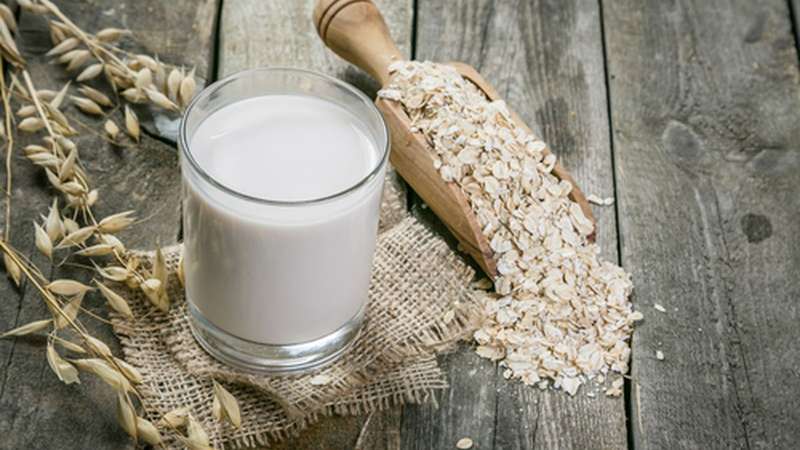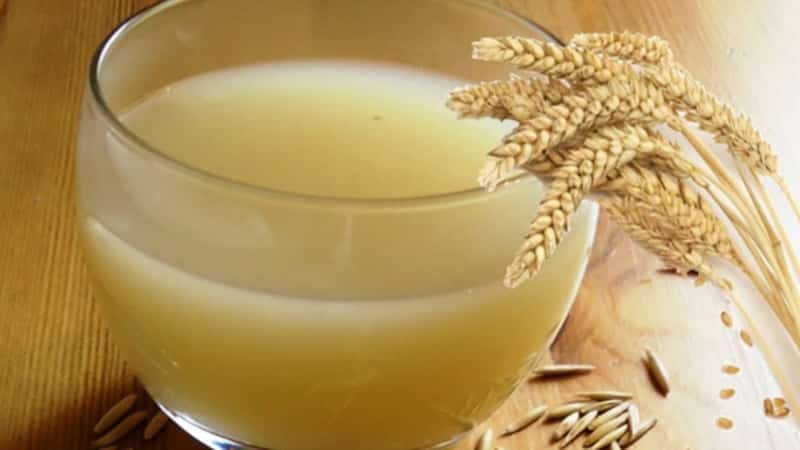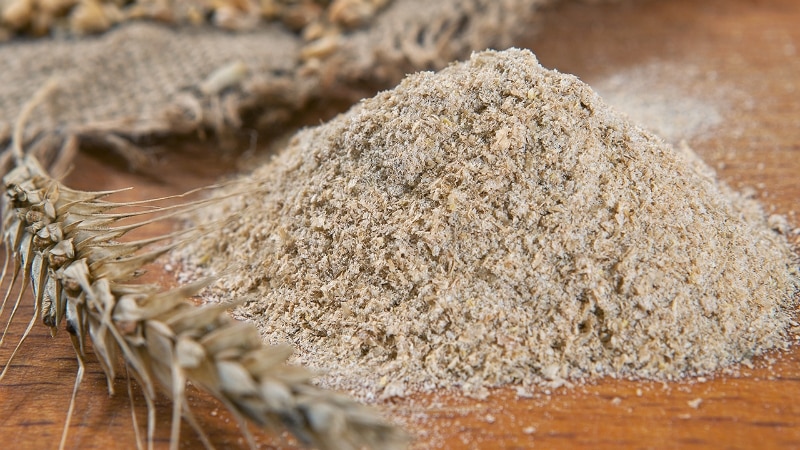Beneficial properties of oats for the stomach
The digestive system is a collection of glands and organs that provide the nutrients the body needs for full functioning. Stress, poor-quality products, unfavorable environment, medications and other factors provoke the occurrence or exacerbation of gastrointestinal diseases. Diseases of the digestive system are so common that every person encounters their manifestations at least once.
To prevent such a situation, traditional medicine advises using oats for the stomach for therapeutic and preventive purposes. In this article we will discuss what beneficial properties of oats, contraindications and side effects, treatment of the gastrointestinal tract with oats, features of its use.
Chemical composition and medicinal properties
Oats are an annual herbaceous plant cultivated on an industrial scale as a food and feed crop. The oat genus includes more than 20 species, of which the most important from an economic point of view is common or fodder oats.
 Raw oats, collected in the husk, are used as medicinal raw materials for preparing decoctions. Whole oatmeal, made by grinding, steaming, peeling, is suitable for preparing pilaf, porridge, and stuffing.
Raw oats, collected in the husk, are used as medicinal raw materials for preparing decoctions. Whole oatmeal, made by grinding, steaming, peeling, is suitable for preparing pilaf, porridge, and stuffing.
The main substances of grain that determine its nutritional value are carbohydrates (59.5 g), proteins (12.3 g), fats (6.1 g).
The carbohydrate complex includes starch as the main substance, dietary fiber, sugars (fructose, glucose, sucrose, lactose, galactose, maltose).
Cereals contain many beneficial substances:
- vitamin A, represented by beta and alpha carotene, lycopene, retinol;
- vitamin B complex: thiamine, riboflavin, choline, pyridoxine, folate, pantothenic acid;
- vitamin E, K, D, H, nicotinic acid;
- macroelements: potassium, calcium, magnesium, sodium, phosphorus, silicon, chlorine, sulfur;
- trace elements: iodine, boron, iron, vanadium, copper, cobalt, fluorine, zinc, chromium, selenium, manganese, nickel, molybdenum.
Oats are valued for their wide range of pharmacological activities. It has a pronounced diuretic and anti-inflammatory effect, regulates blood sugar levels, which is especially important for people with diabetes, provides active cleansing of the liver, kidneys, blood, and promotes hematopoiesis.
The cereal has a beneficial effect on the state of the nervous system, heart and blood vessels, strengthens the immune system, relieves insomnia, and activates mental activity.
Oats help normalize metabolism, active absorption of carbohydrates by the body, and help in the fight against colds, hypertension, reduces the likelihood of cancer, slows down the aging process.
The benefits of oats for the gastrointestinal tract
Oatmeal broth is beneficial for the whole body, but especially beneficial affects the digestive organs, liver and kidneys. It acts as an enterosorbent, which removes toxic substances from the intestines, increases the functional activity of the gastrointestinal tract, and removes excess fluid.
Other benefits of oatmeal for the stomach:
- stimulates mucosal regeneration processes;
- removes necrotic tissue from ulcerative defects on the mucous membranes;
- prevents the occurrence of toxic and allergic reactions;
- improves blood supply to the intestines;
- normalizes metabolism;
- regulates acid-base balance in the blood;
- prevents water and electrolyte losses;
- inhibits inflammation;
- eliminates dysbacteriosis;
- increases peristalsis of the large intestine;
- relieves painful cramps in the stomach;
- reduces gas accumulation;
- restores the body's humoral regulation systems;
- protects mucous membranes from the aggressive action of irritating substances.
Features of application
Despite the benefits of oats for the digestive system, sometimes its effect is not enough to get rid of the disease. Therefore, it is often used as an addition to drug therapy or as a prophylactic agent to prevent relapses and complications.

For gastritis
It is recommended to use oats for gastritis as an anti-inflammatory, analgesic, antispasmodic and regenerating agent to protect the epithelium from damaging influences. The grain also contains ascorbic and nicotinic acids, pyridoxine, which stimulate the production of gastric juice, and vitamin E replenishes the deficiency of natural protective factors.
For reference. As numerous reviews indicate, oats really help against gastritis, and side effects with this procedure rarely occur. It is only important to follow the dosage and take into account contraindications.
For ulcers
For stomach ulcers, oats have an enveloping effect and protect the inner surface of the intestines from mechanical, physical and chemical irritation, and accelerate the healing process of erosive and ulcerative lesions.
In addition to this, oat mucus creates favorable conditions for the reproduction and vital activity of beneficial bifidobacteria, which play an important role in the digestive processes, which serves as the prevention of dysbiosis.
Read also:
Can you eat melon if you have a stomach ulcer?
How to use pumpkin for medicinal purposes for stomach ulcers?
Oats for constipation
Oat decoction for constipation activates the contraction of smooth intestinal muscles, thereby stimulating the excretion of feces and preventing them from stagnating in the intestinal lumen. Oats are also used for increased gas formation, pain, and spasms in the intestinal gastrointestinal tract.

For diseases of the duodenum
Oats are recommended to be consumed for the treatment and prevention of exacerbations of duodenal ulcer. The plant acts as an enterosorbent, accelerates the healing process of ulcerative defects, reduces pain, increases the protection of mucous membranes, and neutralizes free radicals.
Other
Oats have a relatively low glycemic index (55 units), so they must be included in the diet of people with diabetes, especially if the disease occurs against the background of acidosis (a shift in the acid-base balance towards acidification).
Oats help in weight loss. Grains contain fiber, which promotes weight loss by cleansing the intestines of waste and toxins. Fiber gives a quick and long-lasting feeling of fullness, which allows you to give up snacking and reduce the size of portions.Possessing a diuretic effect, the cereal removes excess fluid from the body, which will result in the elimination of swelling and the reduction of centimeters in the waist and hips.
It is recommended to take brewed oats in case of food poisoning. Starch present in grains binds toxic substances and removes them from the body.
The plant also protects the surface of the mucous membrane from the effects of aggressive mechanical and physical factors, and alleviates the severity of symptoms of intoxication.
This is interesting:
Which is better for weight loss - rice or buckwheat: compare calorie content.
Folk recipes and scheme for their use
Before treating diseases of the gastrointestinal tract with oats, it is important to choose high-quality grain. To prepare an infusion and decoction, you need to use grains, not flakes. It is in the shell that the maximum amount of useful substances is concentrated, allowing you to achieve the predicted result in treatment.
When purchasing, pay attention to the appearance of the cereal: good quality oats have a straw smell and a light color.
Advice. To check the quality of grain at home, you need to fill it with cold water. If after an hour or two the grains do not float, then the grain is of appropriate quality; it can be used to prepare a decoction, infusion or any other recipe.
There are several options for preparing and using oats. This is a decoction, infusion, jelly, bran.
Decoction
The decoction is prepared in milk or water, at the rate of 200 g of oats per 1 liter of liquid. Grains contain phytin, which, when entering the body, interferes with the absorption of nutritional components.To break down phytin, oats are washed well until the water is clear, then soaked in boiled, cooled water for 10-12 hours.
After time has passed, the container with the infusion must be placed on the stove and brought to a boil. After boiling, cook covered over low heat for 20-30 minutes. Remove the dish from the stove, cover with a lid and leave until completely cool. Strain the broth through a sieve or several layers of gauze, squeeze out the remainder. The milk broth must be boiled for 60-90 minutes, stirring occasionally.
To prepare a healing decoction, you can use crushed grains, but not dust. 1 tbsp. l. Rinse the cereal until clear water, pour into a thermos, pour 250 ml of boiling water. Leave for 12 hours.
Take 100-200 ml of decoction three times a day, half an hour before meals. The duration of the course is 21 days, unless otherwise specified by the doctor. After a month, if necessary, repeat the treatment.
Kissel
Heat 1 liter of distilled water to a temperature of 40 °C. Pour in 200 g of oatmeal. Leave for 10-15 minutes to swell. Next, cook over medium heat for 30-40 minutes, stirring constantly. Strain the cooled broth through a colander, grind the flakes through a sieve, add to the liquid, and mix. Place back on the stove, bring to a boil and cook for 5 minutes.
Used as the main ingredient sprouted oat seeds. To do this, rinse 500 g of grain until clear water, pour in 1-1.25 liters of water, and leave to steep for one hour. Without changing the liquid, cook the grains until boiling. Then add 1 tbsp. l. with starch on top and cook the jelly over low heat until thickened.
In order to prevent and treat gastrointestinal diseases, take 150-200 ml of the drink three times a day for three weeks.
Bran

Oat bran is an effective way to cleanse the liver, kidneys and intestines of waste and toxins, normalize metabolism, activate digestion and adjust body weight.
The obvious advantage of the recipe is the absence of a preparation step. It is enough to eat 2 tbsp every day. bran with plenty of water. This should be done three times a day 15 minutes before the main meal.
Infusion
It is necessary to pour 100 g of grains with cold boiled water and leave in a thermos for 10-12 hours to infuse. Then strain and drink 100 ml 3-4 times throughout the day.
Important! This infusion is recommended to be used instead of tea for people taking antibiotics or other medications.
Another option for preparing an infusion is known - with alcohol and plant stems. 20 g of crushed green leaves pour 250 ml of vodka or 40% alcohol. Infuse, covered, in a dark, cool, dry place for 14 days. Take the strained infusion 1 tbsp. l. diluted with 30-50 ml of water.
In what cases should it not be used?
Despite the fact that the cereal is beneficial for the body, there are a number of contraindications when oats should not be used to treat the stomach:
- renal and liver failure;
- formation of large stones in parts of the urinary system;
- increased stomach acidity;
- allergy to the product;
- cardiac and vascular diseases in the acute stage;
- abdominal pain of unknown origin;
- period of pregnancy and lactation;
- celiac disease (intolerance gluten free)
Conclusion
Oats have a number of beneficial properties for the digestive system, so they can be used both for the treatment and prevention of gastrointestinal diseases.There are different options for preparing and using oats: infusion, decoction, jelly, bran. Your doctor will tell you which one should be used.
With the right approach, oats show good results in atrophic gastritis, gastric and duodenal ulcers, and constipation. However, there are a number of contraindications that must be excluded before deciding to use the cereal for medicinal purposes.